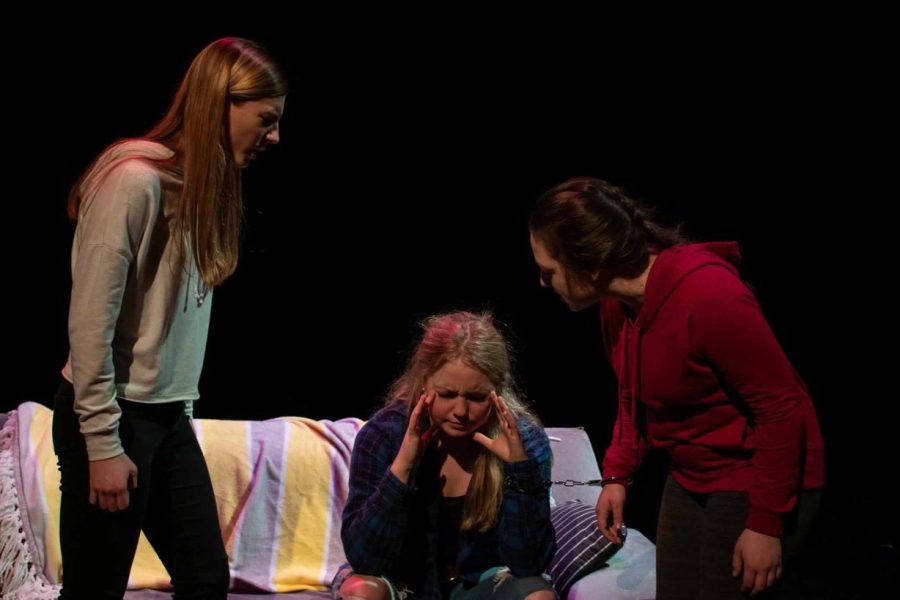Student Theatre Festival showcases student productions
The annual Student Theatre Festival changed it up this year by showcasing only student-created productions for the first time in its history from April 12-14 in the Erdmann-Zucchero Black Box Theatre.
In previous years, the festival has focused on already established productions, but this year, the board decided to select student-written productions. While making their selections, they found the best pieces were written by students.
Daniel-Raymond Nadon, a faculty director for the School of Theatre and Dance, looks forward to seeing the learning outcomes for the three student directors selected for the festival.
“In the classroom, they learn how to do things in the theater,” Nadon said. “In the plays, they work with established directors, they learn how to participate in it, but this allows them to be able to start from scratch and practice their knowledge without interference by faculty. They just get to do it and figure it out.”
The festival showed productions directed by Andy Blubaugh, a junior studio art major, John Smith, a junior theatre studies major and Zoe Harr, a senior English major. Both Harr and Smith directed their own productions and Blubaugh directed a production created by senior theatre studies major Paul Appleby.
Appleby’s production came from a previous idea for a play in which the central conflict was the main character was unable to find a way to get out of bed while in a bad state of mind. While dealing with his own mental illness, Appleby decided to speak with a friend, which led to the idea for “The Wrists.”
“I couldn’t really do much other than get through the day,” Appleby said. “I felt like there was a person attached to me at all times whose sole objective was to make my life harder, and from there it kind of clicked, like hey, that’s an idea.”
“The Wrists” will look at a day in the life of someone who’s fighting untreated depression and anxiety, along with exploring some of the less “sympathetic” symptoms of mental illness such as anger and dysfunction.
Appleby’s study is focused on acting and writing whereas Blubaugh’s is focused on directing and producing, so they came to a working agreement in which he would write and she would direct.
Blubaugh’s direction breathed a lot of life into the show, and at points, she was able to even add some humor into it, Appleby said.
“Andy has an excellent eye for finding comedic high points in a script like this,” Appleby said. “I feel that the changes she’s made throughout our process have probably made this piece more enjoyable from an audience perspective and from an acting perspective too.”
Working together to figure out a balance in the production is important and sometimes, necessary.
“I think in the beginning the production was a lot more disjointed,” Blubaugh said. “Pieces and parts made sense, but it didn’t have a full story arc that brought everything together. As we continued, we really worked to make things come full circle and tell a complete story that had a clear line of action from beginning to end.”
She enjoys the personal aspect of the production and wants to continue to share important messages through her work in the theater.
“I’ve got the opportunity to show people a different side of the depression story: the side that lives with it every day, the side that gets better,” Blubaugh said. “It’s nice to be able to express the optimism I feel through theater. It’s cathartic.”
Smith directed a production called “The Death of Virginia Clemm, ”which explores the relationship between Edgar Allan Poe and his wife, Virginia Clemm, while she suffered from tuberculosis.
His biggest obstacle was figuring out how he wanted to direct the show.
“This is my first real show that I’ve directed, so it was very hard at first to figure out how I wanted to go about the process,” Smith said. “Luckily, I had spectacular actors and amazing friends, who were directing the other shows, that allowed me to study their methods and find out what worked for me.”
Smith is thankful to work with the School of Theatre and Dance and hopes to continue to showcase his love of theater.
“I love my show, which I am still gobsmacked that I have been given the opportunity to do, and I love the School of Theatre and Dance for allowing all of us to show our hearts, our talents, our passions and our love of theater,” Smith said.
The festival is part of the Black Box Series which works to provide students with opportunities to perform, direct, write and manage productions outside of the Main Stage season.
Harr directed a production called “Knowing, Knowing” which follows the story of Max, a high schooler who has just lost his friend and is trying to come to terms with the loss and finding his own self identity through the use of poetry by Emily Dickinson.
The idea came to her when she woke up in the middle of the night with a variety of thoughts running through her head. She began to think about what her life would be like had her friend committed suicide and analyzed the idea, coming up with Max’s main monologue.
The biggest obstacle with putting together this piece for her was unpacking serious topics that needed to be discussed, including depression, sexuality and abuse.
“It’s always hard to unearth things that are frightening, but what is the most frightening aspect of doing so is how real these problems are,” Harr said. “The play may include fictional characters, but the situations are far from fictional.”
Allyson Nichols covers Music, Theater and Dance. Contact her at [email protected].



